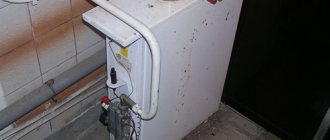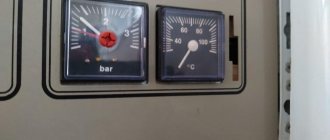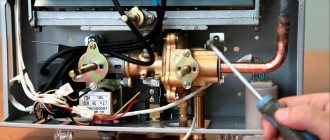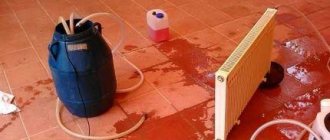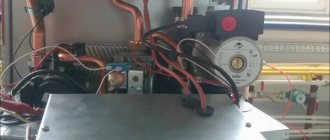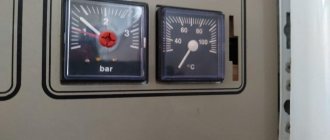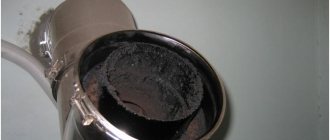My home is my fortress, and in a fortress everything should work like a clock. Agree, when returning from work, we dream of relaxing and enjoying the comfort, and not of repairing the faucet, boiler, or figuring out why the gas boiler is humming. However, it is extremely important to understand the causes of the problem when its first signs appear.
According to the rules for operating gas equipment, regular inspection and assessment of technical condition must be carried out by gas workers. But they cannot identify all impending problems in work, because are not required to visit clients daily. Therefore, it is very important to monitor the equipment yourself and know what to pay attention to.
In this article we will tell you what noise indicates when a gas boiler is operating, and why it whistles, hums, pops or clicks. Timely identification of the cause of sounds will help prevent breakdowns, extend the life of gas-consuming units, and make your life more comfortable and safe.
Causes of noise in a gas boiler and how to get rid of them
The most common reasons why a gas boiler hums loudly are:
- fan malfunction;
- a large amount of oxygen in the coolant;
- sediment on parts;
- reduction in gas pressure.
Fan problems
Sometimes the reason why a double-circuit gas boiler hums is a malfunction of the fan. This is caused by a lack of lubrication and contamination of the blades. In this case, it is necessary to clean the fan and lubricate the bearing with oil. If necessary, the broken part is replaced with a new one.
Excess oxygen in water
The hum of a gas boiler can be monotonous or periodic with crackling. Smooth noise occurs even with new units. In this case, boilers in which the coolant circulates naturally are usually noisy. The cause is an excessive amount of air in the coolant. The fact is that when heated, many air bubbles form in the water, which produce noise. This is the answer to a common question from consumers, why a gas boiler hums when heating. Such noise does not mean there is a problem with the gas unit, but it does cause some discomfort.
The problem can be solved by converting the system to a closed one. You can change the type of system by installing valves and replacing the expansion tank with a membrane one. It will also be useful to connect weather-sensitive automation. Such measures will help extend the life of the unit.
Sediment on gas boiler elements
Another common reason why a gas boiler hums loudly is the accumulation of limescale deposits. When the coolant is heated to more than 60ºC, scale begins to actively develop, which over time clogs the heat exchanger pipes. In this case, the heat exchange between the circuit and the coolant deteriorates, and the efficiency of the unit is significantly reduced. Under the influence of circulating water, pieces of scale break off and move, while they hit the metal walls of the heat exchanger and create a knocking noise.
The problem is solved by cleaning the heat exchanger. However, flushing can only be done on regular circuits. If the bithermal heat exchanger becomes clogged, all you have to do is throw it away and buy a new one. In addition, such circuits become clogged faster than their classic separate counterparts.
Low gas pressure
In some cases, noise in a gas boiler causes a decrease in gas pressure. Because of this, water circulation in the system decreases and air pockets appear. As a result, the unit overheats, trying to reach the required temperature, and begins to hum.
You can eliminate noise by solving the problem of low gas pressure. The reason for the decrease may be:
- low pressure in the line;
- gas pipeline contamination;
- presence of a leak (accompanied by a characteristic smell of gas);
- gas meter malfunction.
If the “root of the problem” is a leak or low pressure in the centralized main, then only representatives of the gas service can help.
If a gas pipeline is clogged, it needs to be cleaned. If a breakdown occurs in the gas meter, fuel will pass through it with difficulty. A symptom of a problem with the meter is noise and crackling noise coming from it. After replacing the measuring device with a new one, the pressure will return to normal and the noise will stop.
Note! It is necessary to know the optimal gas pressure readings and measure it periodically. The value should be within 1.5-2 atmospheres.
Why does the heating boiler click? Why the heating boiler is noisy, let's figure it out together
A recently purchased gas boiler operates quietly, barely noticeable to humans. If during operation the unit suddenly begins to make noise, then this is a direct sign of the first malfunctions in the system.
The fan is out of order, the walls of the heat exchanger are clogged with scale, the components of the device are worn out or the boiler is not configured correctly - all these reasons lead to the device beeping, knocking, humming or making clicks
.
Why does a gas boiler make noise when heating?
There are many reasons
, causing alarming noise in a gas boiler.
Each problem requires a different approach
to fix it.
The fan located above the burner is faulty
The fan provides ventilation in the system to remove and exhaust smoke, and also removes residual gas combustion products. Common Cause
Fan breakdowns occur
during operation.
The longer the boiler operates, the more parts of the system wear out.
Photo 1. This is what a fan looks like in a gas boiler. Its breakdown can cause unpleasant noise coming from the heating device.
Other causes of breakdowns:
- The fan located at the top above the burner
. Constantly being exposed to high temperatures burns out the bearing lubricant. This causes rapid wear. - The fan is full of dust
and residues from gas processing. - Manufacturing defects.
Reference.
There are characteristic sounds that indicate a malfunction of the device.
Listen to the operation of the boiler. If it makes clicking sounds at short intervals
, the cause is the fan.
In order to repair
fan,
the following manipulations should be carried out:
- First, inspect
the fan and
clean it from the inside
: the main blades are located on the inside of the housing, you need to free them from accumulated dust and dirt, and then lubricate the bearings. - If the problem has not been solved and the boiler is still noisy, you can replace the valves with ball valves
or install a rubber gasket. - If the previous measures did not help, then you should reinstall the cooler
. To do this, you need to call a technician and replace the worn-out device with a new one.
Scale in the heat exchanger
A heat exchanger is a boiler component that plays the role of an intermediary between the thermal energy of gas and water
, which heats up from it. Because of it, scale appears and lime accumulates both on the walls of the radiator pipes and in the entire heating system.
Photo 2. Heat exchanger from a gas boiler
Why does the boiler hum when hot water is turned on?
Gas boiler repair specialists note that the occurrence of noise when heating water can be influenced by indirect or more serious reasons.
It is important to keep the boiler clean. Photo source: willow-bag.ru
First, you need to study not the most serious breakdowns that will not be difficult to fix on your own.
Why is the gas boiler humming?
- Serious errors were made during installation or assembly of equipment. To fix the problem, you need to check all parts and connections. If you have no experience in plumbing, then it is advisable to call a specialist who did the installation. He will correct his shortcomings.
- A gas boiler, like any other equipment, must be correctly configured to operate under specific conditions. If the owner of the equipment made mistakes, then loud noises may appear when heating the water. The only way to fix the problem is to carefully read the instructions and re-make the necessary settings.
- The boiler may begin to hum due to old age. If the equipment was purchased many years ago, then some components are probably out of order. In this case, only replacement with new equipment will help.
These problems are rather vague. If the boiler starts to hum, then first you can check these three points, perhaps one of them will help fix the problem. Such operations can be carried out in a fairly short period of time. But if a gas heating boiler makes a lot of noise when heating water, then it is necessary to look for clearer and more serious reasons.
3 main reasons
Boiler noise when heating water:
- One of the main reasons why a boiler hums when heating a liquid is the high concentration of oxygen in the water that passes through the pipes of the device. Because of this, when heated, a large number of bubbles can form in it. This effect produces not only a strong hum, but also noticeable vibrations. A clear sign of increased oxygen concentration is the hum of the gas boiler and the vibration of the batteries connected to it.
- A large amount of air has accumulated in the installed system. If you hear strong puffing and even knocking noises when heating the water, then it is necessary to remove the air from the pipes. Modern boilers are equipped with special taps; they must be opened to release air and eliminate the problem.
- Another common problem that causes a loud humming sound when heating water is the accumulation of salts that are deposited in the heat exchanger. To fix the problem, you will need to open the gas boiler. If its walls are covered with salts, then you were able to find the cause of the buzzing. Due to the accumulation of salts, the equipment begins to work very loudly when heating the water. Thorough cleaning and rinsing of the heat exchanger walls is necessary. It is important to note that thermal output and heating dynamics may also be affected. Initially, the hum will come from the heat exchanger, which is located in the gas boiler.
We recommend reading: Classification of air filters in ventilation systems
To avoid difficulties, it is necessary to check and, if necessary, clean the radiator at least once a year. For these purposes, it is advisable to purchase a pump from a specialized store (otherwise the heat exchanger will not have enough water for cleaning), which has a reagent. The cleaning liquid will be supplied to the gas equipment through hoses.
Fan failure
The fan is quite easy to dismantle.
The fan is usually connected to a special compartment through which combustion products are eliminated. If the fan becomes clogged, the boiler starts to operate very noisily. You can even hear a whistle.
There are several reasons for fan failure:
- First you need to check the condition of the bearings. They should be located directly above the burner. It is possible that the lubricant that should be poured inside has evaporated or leaked. In this case, it is necessary to disassemble the device and lubricate the parts. It is important to read the instructions before doing this and find out which lubricant is suitable for the equipment model you are using.
- If the problem is not resolved by replacing the lubricant, you will have to check the balancing of the blades. Since a large amount of combustion products exits through the pipes, a large amount of dirt can stick to the blades. As a result, when rotating, they will begin to work very loudly and create an unpleasant hum. To restore the fan's performance, it is necessary to thoroughly clean the blades, and then correctly adjust their rotation through balancing.
Excessive pressure in the heating pump
If none of the above methods helps fix the problem, you need to check the pump in the boiler, which can make a lot of noise when the pressure in the system changes. In this situation, you will have to configure it again. If too much pressure builds up in the pump, the first sign of this is the appearance of a humming sound.
It is not difficult to replace a broken pump
In the future, this can lead to an emergency situation that is dangerous to human life. To change the equipment settings, you need to move the white lever on the box where the terminals are located to a different position. As a rule, the problem disappears.
Checking settings
The correct setting is necessary for the boiler to operate without extraneous noise when heating water. If the device overheats greatly, this can lead to the problem in question.
The main reason is the lack of water in the network. In this case, you will need to study the operation of the thermostat and its parameters. Perhaps its settings have gone wrong. You will have to set more appropriate parameters yourself. It is also advisable to measure the pressure inside the system. If there is a need for this, add a coolant inside the device.
You can also regulate the gas valve or bypass on a gas boiler, which is also called a jumper. If a humming noise starts when the water heats up, then these parts need to be adjusted.
Popping sounds appeared
If clicking or popping noises are observed during startup, you need to check the following parts:
- Three-way valve. This is a switch from hot water to heating. If clicks are observed during operation, the valve must be replaced.
- The spark takes a long time to fire. If the burner is unstable, a spark may not appear immediately. This will cause a gas build-up to form. As soon as ignition occurs, it will flare up and you can hear popping sounds. To fix the problem, you will need to check the burner and igniter, as well as all contacts.
- The chimney or filter is clogged with dirt. The solution is thorough cleaning. The chimney is checked with a lit match. It must be brought close to the ventilation; if the flame sways, then the system is working properly.
By checking these parts, replacing them or cleaning them, the boiler will stop making clicking noises every time it ignites.
Conclusion
A gas boiler is a necessary thing in a private home. Therefore, when purchasing, it is necessary to carefully study the instructions for it in order to find out about the existing parts of the device that may have to be repaired. If you properly care for and timely adjust the equipment and clean certain parts, then you can reduce the likelihood of extraneous noise appearing in the boiler when heating water. The device will operate normally.
What can cause clicking noises?
If the gas boiler clicks, you need to try to find the reason. If the equipment is used incorrectly, it becomes dangerous. Therefore, if extraneous sounds appear, it is necessary to carry out diagnostics, identify the source of the sound and eliminate the defect yourself or with the help of a specialist.
Burner installed incorrectly
If the burner is ringing, the reason may be hidden in incorrect installation.
To ensure that the part is in good condition, it is recommended to check the pressure level of the gas exiting the burner.
You can find out the required indicators in the instructions for the device. If they do not meet the standards, the burner must be adjusted.
The appliance is noisy when heating water
Noise may appear when the water is heating up. This situation can be caused by incorrect installation or configuration of equipment. Therefore, you should check whether the device’s performance meets the standards specified in the instructions for the device.
Worn parts can lead to these problems when heated. Then it is necessary to replace the failed elements. Sometimes when water is heated, noise occurs due to high oxygen content. Because of this, as the temperature rises and the liquid heats up, bubbles begin to appear. Which leads to the appearance of various unusual sounds and vibrations of the boiler.
Excess pressure in the heating pump
A pump is necessary to create high pressure in the device. Therefore, if it fails, its operation must be adjusted. Increasing system pressure can cause a dangerous situation. If the water level drops, this will cause the equipment to overheat. The thermostat needs to be adjusted. In some situations, they add water to the device themselves.
If the boiler makes sounds similar to howling, the problem may be hidden in the settings of the gas valve.
It is necessary to adjust it and check the jumpers. The increase in power is related to the gas meter. The valve may also wear out. This results in loud noises when the equipment operates. The valve needs to be changed immediately. If the noise does not decrease after this, then ball valves are installed in place of the valves. Additionally, it is recommended to equip the device with a rubber gasket. When these measures do not help, the cooler is replaced.
Other Possible Causes
Another phenomenon that worries owners of gas equipment is the clicking and popping noises that occur during ignition. Failures are possible in the following components:
- in a three-way valve. It serves as a switch between domestic hot water and heating; when a malfunction occurs, it clicks. The solution to the problem is to install a new one;
- in the ignition unit. A loud bang accompanying the long appearance of a spark indicates the accumulation of gas, which subsequently flares up. It is necessary to carry out diagnostics - inspect the burner, electrodes, igniter, contacts.
If a blockage has formed in the wick or chimney, the boiler will bang when ignited, which often happens with semi-automatic models.
Clogged injectors are indicated by noise during heating, while it is extremely difficult to ensure ignition, and a fragmentary flame occurs. Here you need to stop the gas supply and clean the holes with a thin wire.
A clogged wick is recognizable upon inspection and is easy to clean. In the case of a chimney shaft, you need to make sure that there is draft: bring a match flame to the ventilation or control window; if the fire is steady, you will have to remove the blockage. In units with automatic ignition, the electrode often gets clogged.
If the installation was carried out incorrectly, the clanging of metallic impacts may occur if the housing is hung incorrectly. When heated and cooled, the metal changes its geometric parameters; expansion and contraction are accompanied by loud sounds.
We recommend reading: Gas consumption for heating a house of 70, 100, 150 and 200 m2: average consumption
The same processes are characteristic of pipes walled into walls, so when installing them it is important to leave an expansion gap.
If the heat exchanger plates are clogged, the boiler also begins to make loud noise when heating, the reason being clogging with soot, dust, and soot. You need to remove the housing and clean all components of the heat exchanger with a special pump or a metal brush. Dust could have clogged up in the mesh, which is visible in the lower part of the body, which causes a decrease in thrust in models with an open combustion chamber.
Resonance due to uneven operation of the circulation pump can also manifest itself in the form of noise. In this case, it is enough to adjust the pump settings.
Why does the speaker crack and click?
Clicking and crackling noises are another common malfunction of gas instantaneous water heating equipment. Failure occurs in both automatic and semi-automatic boilers. Below is the nature of the sounds and what exactly can cause them:
- The gas heater clicks, but does not ignite - the contacts on the ignition unit have oxidized. The module cannot be disassembled and requires replacement. The catalyst for the geyser crackling but not igniting can be dead batteries.
- The gas water heater clicks after turning off the water - the “frog” water regulator has failed. Inside the block there is a rod with legs connected to the ignition block. After turning off the water, the metal rod should be returned to its original position by a spring. If the rod is rusty, it may jam. The ignition unit remains switched on and continues to produce a spark. For this reason, the speaker crackles after switching on. The malfunction can be caused by a coarsened frog membrane - it needs to be replaced.
- The piezoelectric element is constantly cracking - the contacts have oxidized, which leads to jamming and stable operation.
Noise in the column is caused by insufficient draft (the flame burns with a hum, changes color, soot is present), poor air circulation (observed after installing metal-plastic windows in the kitchen), clogging of the burner ignition wick or scale build-up on the heat exchanger. The malfunction is found by elimination during the next maintenance of the column.
Why does the gas boiler hum and/or whistle?
There are times when the boiler interferes with the noise it makes. When the burner operates, it makes a noise similar to that of a jet plane. The gas boiler is noisy and can be heard throughout the house. It naturally interferes with sleep, especially when it turns on after a pause. How to reduce the noise made by a gas boiler?
Usually, it is not the boiler or the fan installed in it that makes noise, but not the correct installation of the chimney. To make the boiler start to make a noisy sound, you just need to narrow the chimney a little, and you will get a sound like at the airport. The solution is to change or expand the chimney.
There are very frequent cases when gas equipment with pressurized burners begins to hum. The fact is that fan units are equipped with a stabilization system aimed at regulating the gas pressure supplied to the combustion chamber. When operating, such a boiler hums like a vacuum cleaner. To reduce unpleasant humming to a minimum, it is better to build the boiler room building away from a residential building and provide good sound insulation for it.
The boiler may begin to hum due to a thick layer of deposits on the inside of the heat exchanger tube. The boiler begins to boil - it makes a sound like the sound of water in a boiling kettle. The primary heat exchanger is clogged. You can check this in the following way: set the boiler to the maximum temperature and close the return or supply valve so that there is minimal water flow. When the temperature reaches about 80 degrees, the hum increases. The only way to solve the problem is to clean the heat exchanger.
Shock-absorbing lining - what is it?
The shock-absorbing lining is a rubber sheet 10-12 mm thick or rubber washers of the same thickness. To reduce noise, all connections must be sealed and rigid, the chimney must be additionally insulated with thermal insulation (basalt mineral wool, etc.)
It happens that when you press the ignition button, a whistle is heard from the pilot burner nozzle. If air appears in the gas pipeline or gas fittings, it is necessary to unscrew the nut at the junction of the gas tube to the gas fittings, press the ignition button, having first loosened the pipe, bleed out the air until the smell of gas appears. Tighten the nut.
If there is a flame separation, the pilot burner gas pressure should be adjusted using the adjusting screw. There are times when the wrong nozzle is installed, then it just needs to be replaced. This situation occurs in domestic units. The injector may also have a manufacturing defect, expressed in the absence of a chamfer along the edges of the holes. When switching to high intensity mode, the gas flow escapes and the boiler begins to whistle. The only solution in this case is to replace the nozzle.
We should not forget that gas boilers are explosive, so to fix problems it is better to contact specialists by phone.
There is a popping sound when igniting
When a gas boiler makes noise when turned on, with knocks, clicks and pops, you need to immediately solve this dilemma. Causes of noise:
- Problems with the three-way valve. With its help, the boiler switches from DHW to heating function and vice versa. If it clicks constantly, it needs to be replaced.
- The cause of the pop is the prolonged ignition of the spark. A lot of gas is formed. And when ignited it bursts into flames. It is necessary to check the burner, igniter, electrode and all contacts.
- The filter or chimney is clogged. They need cleaning.
Checking the chimney shaft is carried out as follows:
A lit match is brought to the ventilation. If the fire is deflected, the draft is normal. If it burns directly, cleaning is required.
You can clean the shah yourself. But their total cleaning is the prerogative of public utilities.
If a gas heating boiler with automatic ignition is noisy, then the reason lies in a clogged electrode. This element is cleaned and placed 3-4 mm from the burner itself.
- The injectors are clogged. It is necessary to turn off the gas for a while and clean them using a thin wire.
- Installation errors. If the body of the device is hung incorrectly, then when the facing side is heated, the metal is deformed. When cooled, it returns to its original form. This effect is observed in pipes embedded in walls. Then, when you turn on the hot water, the gas boiler hums. When installing pipes into walls, it is necessary to maintain a small space for such deformations - expansions.
- The plates in the heat exchanger are heavily clogged. Types of blockage: dust, soot, soot. It is necessary to remove the housing and thoroughly clean these elements. A special vacuum cleaner is used.
Points 5 and 6 are the most common answers to the dilemma, why does the gas boiler make noise when you turn on the hot water?
It is worth checking the mesh under the body as well. If necessary, clean it.
- The heating pump is not functioning correctly. Resonance appears in the system. If this occurs only when the heating pump is turned on, then its settings need to be corrected.
Before any work, be sure to close the gas valve. If you smell gas, call a special service.
Check if the gas boiler is noisy. To reduce vibration, it is worth laying a gasket under its body.
Answers to pressing questions
In what cases can air get into the heating system?
Air bubbles penetrate inside for a number of reasons, the most common of which include the damaged integrity of the ligaments, complete removal of water from the pipes and depressurization of equipment.
Why might the fan be faulty?
The main function of the fan is to remove combustion residues. As a result, it periodically becomes clogged with dust. Under the influence of high temperatures, its lubricant may dry out. All this together stimulates its wear and tear. Sometimes a faulty fan is a manufacturing defect.
What causes a whistle that sounds like a boiling kettle?
The most common reason for this phenomenon is the formation of scale with the subsequent narrowing of the passage of the device. In this case, whistling sounds appear approximately 20 minutes after starting the heating system.
Why do rattling sounds occur when the boiler is turned on?
Rattling occurs when the valve in the boiler wears out badly.
Why does the flame ignite jerkily when the boiler is turned on?
This happens when the injectors are severely clogged. The problem is solved by turning off the gas supply and then cleaning the cavities with a thin wire.
Regardless of the cause of the noise, the problem cannot be ignored. The sooner it is eliminated, the better.
Cases for models of certain brands
The following discusses common causes of various noises in boilers of famous brands.
First. Navien. If the error is not reflected on the device’s display, but the equipment is very humming and noisy, then you immediately need to quickly figure out why the Navien gas boiler is noisy?
Causes:
- Blockages in the form of scale.
- Problems with the thermal fluid.
Actions:
- The device is disassembled.
- The heat exchanger is cleaned or replaced.
- The taps are checked for maximum openness.
- The water temperature decreases.
Second. Beret. Usually their devices have an atmospheric burner. Then the noise is very low. But if they increase, then in Beret units the reasons for this are most often:
- Poor heat transfer in the heat exchanger. This ends the use of DHW. Scale accumulates in the heat exchanger.
- Incorrectly selected pipes.
Third. Conord. These models most often make noise under increased loads, for example in cold weather. According to documents they are the same power limit, in practice they are lower. If the documentation indicates 13 mbar, then in reality it is 10 mbar. Therefore, there is no need to configure the device to maximum.
Fourth. Baxi. Most often they make a lot of noise during the heating function, while during hot water supply the noise is weak. Actions: checking the bypass, cleaning and adjusting the valve. This work is usually carried out by service employees.
Fifth. AOGV. Their users often complain about whistling. Once ignited, it becomes stronger. After disconnecting it disappears. For example, if the AOGV-17.4 model whistles, the reasons for this are as follows:
- Scale accumulations.
- Clogged filter in the inlet section.
Sixth. Vaillant. Often these boilers hum after ignition and turning off the fire (the pump is on). Without the heating function there is no noise. Causes:
- Clogged strainer. The solution is cleaning.
- Problems with the valve on the bypass line. The solution is to adjust the valve.
Seventh. Ariston. The reasons for the noise in the boilers of this company lie in poor circulation of the coolant.
It is necessary to remove and thoroughly clean the heat exchanger and blow it with a compressor.
Eighth. Arderia. When an Arderia gas boiler makes noise, the reason usually lies in an incorrect pump setting. If it is not possible to set up the pump, it is replaced under warranty.
Types of noise and its diagnosis
If water makes noise in the heating pipes during heat supply operation, then there are certain reasons for this effect.
First you need to identify them, and then begin to reduce the noise or eliminate it completely. Why is the water noisy in heating pipes and how to correct this problem? Let's look at the main types of extraneous sounds. They point to the objective factors in the occurrence of an undesirable effect:
- Crackling in pipes. Occurs when the heating system is turned on;
- Clicking sounds that appear at regular intervals;
- Constant hum in transport highways;
- A barely audible knock.
All these extraneous effects - noise in the heating radiator or radiators - significantly reduce the comfort of living in the house. In addition, they may indicate improper operation of the heating supply. If action is not taken to correct the situation in time, some heating element may fail.
If the heating pump or other system component is noisy, you should first try to localize the cause of the extraneous sounds. To do this, it is recommended to use the following method:
- Monitor the frequency of occurrence of the effect.
- Try to identify the relationship - temperature increases in pipes, pressure surges, etc.
- Make sure that the noise in the heating boiler comes from it, and not from other objects located in the boiler room.
If it has been determined that the source is a component of the heating system, certain actions should be taken to eliminate this phenomenon.
Scale on boiler parts
Due to the fact that the water is not filtered before it hits the heating elements (read about choosing a filter for heating in a separate article), therefore sediment often remains on the internal surfaces of the gas boiler. Parts gradually lose their functionality. The problems start with the heat exchange elements. Further, sediment forms on the walls of radiators and pipes, this reduces the space through which water should flow. Getting rid of scale is quite simple; just open the gas boiler and clean it using special means. In this case, only the wear resistance of the equipment itself suffers. To avoid such problems in the future, it is enough to carry out periodic preventative cleaning.
We recommend reading: Kitchen hood: types, pros and cons
Humming, howling
The loudest and most unpleasant type of noise. Pipes can start buzzing out of the blue and give rise to poltergeist stories. However, mysticism has nothing to do with it, and communication with spirits will not save you from noise in the pipes.
When a hum occurs, you need to look for a coolant leak. First of all, a thorough inspection of your home is carried out, then all neighboring apartments. If everything is dry, then the search continues in the basement. A cloud of steam, a puddle or a whistle will help you easily determine the place where the water is leaking. In apartment buildings, repairs will be carried out by the management company, in private houses - by the owner of the property. After inspecting the problem area, a decision is made on how to eliminate the malfunction - by repairing or replacing the unit; sometimes it is enough to simply tighten a poorly closed valve.
Another reason for the hum may be the use of pipes in the heating system with a diameter smaller than the calculated one. In this case, the problem area is determined by ear, and the required section of the pipeline is replaced with material with greater permeability. With the correct selection of pipes and high-quality performance, you will no longer have to listen to the pipes hum.
Distribution unit of a central heating system in the basement of an old apartment building
Knocking in boilers and pumps
Boiler equipment used to equip heating systems can operate on various types of gaseous, liquid or solid fuel, or also on electricity. However, the operation of boilers of any type may be accompanied by certain side processes, which often affect the heating system and can cause noise in it.
In particular, wood or coal solid fuel can lead to clogging of the chimney with a decrease in draft force. The operation of boiler houses using liquid diesel fuel may be accompanied by incomplete combustion and accumulation of soot. All this often leads to noise and humming in heating communications, and requires measures to eliminate these problems.
Noise may also appear due to malfunctions of pumps, valves or other devices and mechanisms located in the boiler room or basement. The solution to the problem in such situations is to repair faulty elements or replace them.
In general, any specific situation with the occurrence of noise in the heating system requires an individual approach, and there cannot be universal methods here. In some cases, identifying and eliminating faults on your own can be very difficult, and in this situation, the only way out of the situation is to contact qualified specialists.
Conclusions and useful video on the topic
The reason for the noise during operation of the gas boiler:
Whatever gas boiler is installed in your home, first of all you should make sure that it is installed correctly. Equipment requires regular preventive inspection. This will allow problems to be identified and corrected in a timely manner.
It is recommended to periodically clean the coolant from dirt and scale. These simple manipulations will allow the device to work as long as possible, efficiently and without extraneous noise.
Have you ever encountered a gas boiler that slams, clicks, whistles or makes noise? How did you resolve this problem, or what services did you contact? Share your experience with readers in the comments and ask our experts any questions you have.
The heat exchanger is clogged
This happens if your home has poor quality water. When heated, substances contained in water settle on the elements of the system. The more scale, the lower the performance of the equipment. The sediment may well cause noise when the boiler is operating. The heat exchanger is one of the most important parts of the boiler. It heats up due to gas combustion and transfers its heat to the coolant. In this case, the whistle appears some time after the equipment is turned on. Any plaque negatively affects the quality of operation of the boiler and reduces its service life. To get rid of deposits, it is necessary to clean the heat exchanger mechanically or using special chemicals.
Prevention measures
If the boiler hums when starting up or turning on hot water, you must first make sure that there is a sufficient level of liquid in the system and, if necessary, top it up. If sounds are coming from radiators and pipelines, it means that air pockets have formed in them, which should be removed. If the pump knocks or whistles, it is most likely a manufacturing defect: you will have to install a new working unit.
An effective preventive measure is timely removal of scale from the heat exchanger. It is also important to monitor the gas supply so that the pressure does not build up too high.
Examples of models from famous brands
The following discusses the most common causes of noise and whistles in models of some brands.
Navien
Why does the Navien gas boiler whistle? Often the causes of noise in these units lie in:
- weak pumps,
- clogged parts.
For example, if your Navien Ace boiler is whistling, then most likely the cause is a problem with the pump, especially if the model was purchased recently. You will need a special stabilizer.
Mimax
Why does the Mimax boiler whistle? Common reasons:
- Water shortage. It is pumped up by a pump.
- Air shortage. The window in the room with the boiler opens.
Baxi
If your Baxi boiler whistles, common reasons are:
- Errors in gas valve adjustment.
- Incorrect gas pressure. Its norm is 13 mbar at maximum power.
- Blockages in the gas reducer or burner.
Gas pressure is checked. The device is disassembled and studied. This is a job for an expert. Self-intervention often only makes the problem worse. There are also often difficulties with assembly.
AOGV
Why does the AOGV boiler whistle? Common reasons:
- Resonances in the burner.
- Fan malfunction.
In AOGV automation, very modest gaps are of great importance. Cleaning the solenoid valve often helps solve the whistling problem. Also, parts that need lubrication are lubricated very generously.
Knocking, rattling
The cause of the knocking noise is usually a poorly secured pipe or radiator bracket. The slightest vibration when the coolant passes through such a unit causes rattling, and if the supports are very loose, the radiator hits the fasteners. The system will stop making noise if the brackets are firmly fixed. To dampen vibration, you can install a heat-resistant rubber gasket between the device and the support.
Sometimes knocking noises can be caused by parallel or intersecting pipes being too close together. During temperature deformations, one pipeline begins to touch another, beats against it and becomes a source of noise. Sound insulation can save the situation if the available gap is enough to accommodate it. Otherwise, to eliminate the knocking, you will have to shift the problem area.
In some cases, knocking on heating pipes in apartment buildings is caused by dissatisfaction with neighbors. This type of noise is usually characterized by a lack of periodicity and occurs in the form of a reaction to certain provoking actions. It’s just that all residents have to “enjoy” the specific sounds. Technical measures will not help here; sound insulation can only partially save. Conflicts with neighbors can only be resolved through dialogue and diplomacy.
Expert advice on preventing unwanted sounds from appearing in the heating circuit
The likelihood of noise in heating pipes can be reduced by adhering to the following professional recommendations:
- when welding polypropylene pipes, strictly observe the heating time of the parts being joined, since overheating leads to a decrease in the working clearance, and underheating leads to low reliability of the connection and a high probability of leakage;
- bend metal-plastic pipes using a pipe bender to avoid reducing the diameter of the pipeline in the bending section;
- heating circuit pipes must be equipped with heat and sound insulation;
- when welding metal electrically, you need to use only high-quality electrodes of the appropriate brand;
- at the highest points of the heating system and at the last devices of each branch, it is necessary to have Mayevsky valves for air release;
- valves and filters must be installed only in accordance with the specified flow direction;
- the pump power must correspond to that required for a particular system;
- To avoid airing, radiators should be installed strictly horizontally - using a bubble or laser level;

